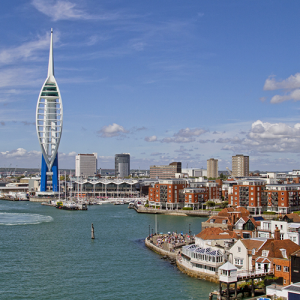13 April 2007
The break-up of the Home Office is being driven by counter-terrorist imperatives and political manoeuvring. It should make us nervous, argues Philip Johnston
Almost a year ago, not long after becoming home secretary following the brutal defenestration of his highly capable predecessor, John Reid appeared before the Commons home affairs select committee.
This was the infamous occasion when he described the Immigration and Nationality Directorate of the Home Office as 'not fit for purpose'. Reid said a lot of interesting things in that two-and-a-half hour session about the challenges he faced and how he proposed to confront them. But he was clear about one thing: he had no intention of splitting up the department.
He was asked quite specifically by committee chair John Denham whether one of the possible outcomes of the review he had put in place could be the break-up of the Home Office 'into different component parts'.
Reid replied: 'I do not believe it is intrinsically dysfunctional; indeed, I believe as time has gone on, the range of areas which are under the framework of the Home Office have become more interrelated in a sense. Let me take the question of security.
'If you are going to deal with the question of security, then the coherence and co-ordination of asylum, immigration, deportation, prisons, probation, law and order, police, Special Branch and MI5 [are] absolutely vital now; because the complexity of fighting against international terrorism means that you need that range of response in the most co-ordinated fashion. I do not myself see the argument for splitting up the Home Office as being an a priori solution on the basis of what I see.'
So what made him change his mind? Evidently, when Reid made those comments he had been in the job only a few weeks and was not in much of a position to be ruling anything in or out. He would have been advised by his senior officials that breaking up the Home Office was not the right way to proceed. After all, which permanent secretary wants to see his empire reduced?
Moreover, the Home Office had already been slimmed substantially in recent years so that it could concentrate on what were regarded as its core responsibilities – catching criminals and locking them up, border controls and immigration, and counter-terrorism. In the past ten years, it has lost responsibilities for licensing, gambling controls, fire services, obscenity rules, human rights, equal opportunities, communities, animal welfare and charities. Twenty years ago, it was responsible for broadcasting and civil defence as well. Now, it is to lose prisons and probation.
What had already become a ministry of the interior is effectively being turned into a security ministry, focusing on counter-terrorism, mass migration (with all the accompanying identification paraphernalia such as e-passports and identity cards) and international organised crime – the three issues that Reid believes most voters want the department to focus on.
As far as the government is concerned, the key element of the recently announced reorganisation is the creation of a more streamlined counter-terrorism structure within the Home Office. Reid wanted to produce a more 'seamless' response to the Al-Qa'eda threat, both at home and abroad, and considered that this was not possible without hiving off some of the department's penal responsibilities.
He was asked by Tony Blair last autumn to take a look at the counter-terror structure, and had his officials draw up a plan to show the lines of accountability. The result confirmed how incoherent it all was. However, the structure that has taken its place does not look that much different. True, there is to be an Office for Security and Counter-Terrorism inside the Home Office. It will be in overall charge of Contest, the government's almost invisible counter-terror strategy, and feed into a committee that will meet weekly, with the home secretary as chair. This, in turn, will report to another committee, meeting monthly, chaired by the prime minister.
But these are changes of process. The main operational arms, such as the Joint Intelligence Committee, the Joint Terrorism Analysis centre, MI5, M16, GCHQ, will all retain their autonomy and, in the case of the latter pair, their lines of accountability to the Foreign Office. The Cabinet Office maintains its administrative role in co-ordinating the collection of intelligence, with a direct line up to the prime minister. The police anti-terror operation is unaffected.
Ask anyone working in counter-terrorism whether this reform will make any difference to what they do and the answer is an emphatic no. The one innovation is the creation of a somewhat sinister-sounding outfit charged with winning the 'battle of values and ideas'. This was immediately seen as a propaganda operation, of the sort that used to exist inside the Foreign Office many years ago to counter Soviet disinformation.
Both Blair and Reid have sold this reform on the basis that it will significantly improve the country's ability to fight terrorism. Some commentators believe that the more strategic approach will make the politicians feel they are more involved than they really are. Yet even if the new structures change little on the operational front, they will streamline the government machinery and make it easier for ministers and senior officials to understand the often Byzantine world of security. They should, theoretically, enable the home secretary to focus on the terrorist threat without being constantly distracted by other concerns, even though Reid himself took the view at the start of his tenure that maintaining his department's integrity was essential to the fight against terror.
If there is an intellectual coherence to the new security structure, it is by no means clear that the same can be said about the other side of the reorganisation – the new ministry of justice. Many have argued for this for years. There is a certain logic to having sentencing and penal policy under one roof as they are in other countries. But no sooner had the plan been announced than the vested interests began to manoeuvre.
The judiciary put down an immediate marker, warning that judges would not be browbeaten by the ministry into passing sentences that do not fill up the prisons too quickly. However, that was all it was: a marker. Lord Phillips of Worth Matravers, the lord chief justice, was quick to say he did not object to the ministry in principle. Nor should he. It is probable that the new department will be far more amenable to lobbying from the judiciary than the Home Office – which treated the judges with deep suspicion, if not outright hostility – ever was. The judges' persistent demands for an end to mandatory sentencing, for instance, might get a more sympathetic hearing from a justice ministry made up of the old Department for Constitutional Affairs with the penal bits of the Home Office bolted on.
It was a bit odd, to say the least, to hear Phillips issuing a warning that the new ministry should not put pressure on the judges to pass shorter jail sentences or non-custodial terms when such an approach has been precisely what he has been advocating himself for months. What he meant, of course, was 'keep your tanks off our judicial lawns'. He does not want the new department thinking it can boss the judiciary around and he is right to make clear the demarcation lines now before it opens for business.
However, these lines are not as clear cut as they might be, or should be. According to the Downing Street announcement of the new arrangements, the ministry of justice will be responsible for policy on the overall criminal, civil, family and administrative justice system, including sentencing policy, as well as the courts, tribunals, legal aid and constitutional reform. It will take the leading role in delivering a fairer, more effective, speedy and efficient justice system, and also in reducing re-offending. It will be in charge of criminal law and sentencing policy.
Yet, 'in order to maintain the government's clear focus on public protection, the home secretary will continue to have a core role in decision making in this area, reflecting his responsibilities for crime reduction'.
Not only that, he will retain responsibility for dealing with prolific offenders, who Blair told us recently were responsible for half of all crimes, yet will not have control over the probation and prison services, which have to deal with them. The Home Office will also keep overall control of policy for drugs and 'Respect' – the antisocial behaviour agenda. Who has primacy here? What is meant by a 'core' role? Obviously, there is a Cabinet committee to settle inter-departmental differences, but what we will have here is two Cabinet-ranked ministers fighting over the same policy area. Furthermore, the government has given a pledge to find 8,000 additional prison places over the next few years. Delivering this is now the responsibility of the new ministry of justice. Lord Falconer, the current lord chancellor, has said the money will be transferred from the Home Office to his department. But since nobody knows how much it will cost and the Home Office budget has been frozen in real terms for three years, is there enough in the pot?
With the prison population continuing its inexorable rise – it is now above 80,000 and heading north – this could be the first crisis for the new ministry. The system is at bursting point – there are no more police cells to hold the additional numbers. Martin Narey, a former head of the Prison Service, believes there could be 100,000 in jail within five years if current trends continue – and no new prisons are being built, even if a desperate attempt is being made to add capacity.
Is this really going to work?
Whitehall officials, in a word play on Reid's early judgement on the Home Office, said the department was being 'split for purpose'. But will the division of the Home Office create sleek, hyper-efficient ministries, one capable of confronting the threat from international terrorism, the other better placed to deal effectively with more mundane, day-to-day criminality? Or is it simply a recipe for ministerial turf wars, a shuffling of deckchairs on the Titanic, a dog's breakfast of a reorganisation, an ill-thought-out and politically driven reform that will come back to haunt the government?
Since the new ministry of justice does not open for business until May 9, it is too early to say which of these scenarios is the more accurate. But there are already worrying signs that it might be the latter. The time frame for reorganisation is also exceptionally tight. It is claimed that this is more designed to fit in with Blair's final bow on the political stage, due to be announced around the same time, than with the interests of good governance or the 50,000 staff who will be affected.
Reid clearly thinks he has the best of this new deal and has shuffled off the worst bits of the Home Office to the new ministry, which could almost immediately be overwhelmed by a prison population crisis that is not going away merely because the plate on the door has changed. But who would want to be the first secretary of state for justice, especially if one of the first decisions he or she might have to take is to release thousands of prisoners early, a political kiss of death if ever there was one? Falconer will take over to begin with but he is widely expected to leave office when Blair departs in the summer.
Inevitably, because this role could not be filled from the Lords without a huge political row, his successor will be chosen from the Commons.
Perhaps the new Labour leader, whoever this may be, will offer the post to Reid. Then watch the colour drain from his face.
Philip Johnston is home affairs editor of the Daily Telegraph
PFapr2007



















